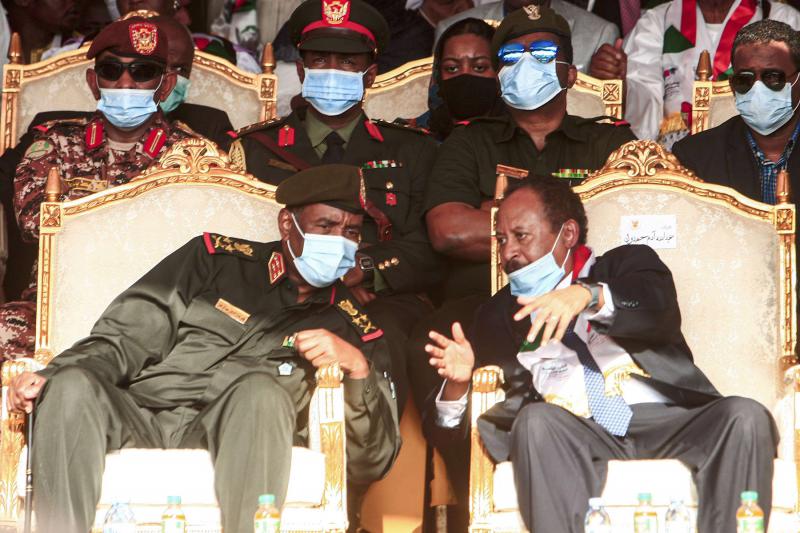Tensions in the capital, east: Sudan faces coup attempts and economic blockades
26 September 2021
Tensions in the capital and eastern Sudan have pitted the country’s civilian politicians and military to near breaking point this past week as accusations and counteraccusations follow an alleged coup in Khartoum and ongoing protests in Eastern Sudan.
Early Tuesday morning, Sudan’s military claimed to quash a military coup orchestrated by 21 officers and soldiers linked the Armoured Corps and the Airborne Forces, according to Ground Force Commander Lt-Gen Essam al-Din Karrar. It marks the fourth coup attempt since Sudan formed a transitional government comprising of civilian and military elements in August 2019. It is also the first time individuals have been arrested for partaking in the coup plot, according to the premier’s advisor, Yasser Arman. “We have to admit that there is a civilian-military crisis in Sudan,” Arman said on the international Arabic broadcaster, Al-Arabiya.
A war of words
While the purported coup attempt ended without bloodshed, a war of words between the civilian and military wings of government ensued.
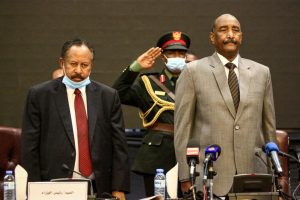
For the first time, Prime Minister Abdalla Hamdok hinted that some of the individuals involved in the coup attempt were part of the current military –not solely those ousted from the former regime. “What happened today is a coup orchestrated by elements inside and outside the army and was preceded by a systematic incitement and high-level arrangement and coordination,” Hamdok said on Tuesday in a speech aired on national television. Hamdok and the leaders of the Forces for Freedom and Change (FFC) pointed an accusing finger at Burhan saying he delayed crucial security sector reforms and refused to sack the Islamist elements within the military, according to news reports. They added that this inactivity has helped enable Islamists to carry out attempts to seize power, both in the past and today.
According to Jonas Horner, Senior Sudan Analyst at the think-tank, the International Crisis Group, the coup has also “allowed the civilian side of the government to claim that security forces are ineffectual and divided and that they must be consolidated and brought under civilian control.”
Meanwhile, Sudan’s military leadership was quick to accuse the civilian-staffed government of ignoring the Sudanese people’s needs, suggesting that they had given coup-plotters an opportunity. Sovereign Council Head Lt.-Gen. Abdel Fattah al-Burhan and his deputy, General Mohamed Hamdan Dagalo (known as ‘Himmedti’) repeatedly claimed the civilian politicians of seeking personal gains and ignoring the goals of the revolution in public appearances. “Politicians are the main cause behind coups because they have neglected the average citizen,” Himmedti said via Sudan’s news agency, “…and are more concerned fighting over how they can stay in power.” During a military graduation ceremony in Omdurman, Burhan claimed it was the military who were defending the revolution and supporting transitional democracy. “Political parties have nothing to do apart from fighting for their posts and chairs, neglecting the suffering of our people, and focus only on attacking and criticizing the military,” the sovereign council leader told army recruits on Wednesday.
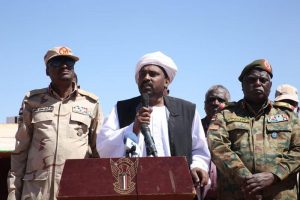
The war of words became so harsh, civilian Sovereign Council member Mohamed el-Faki referred to Burhan and Himmedti’s public statements as “the real coup” in Sudan during a recent interview on state television. In recent times, El-Faki said, the civilian and military components of Sudan’s transitional government remain perpetually averse to one another. “Our meeting never reaches a political process or results,” the sovereign council member said. “We were fine and agreed [on issues] in previous periods, but now there is an incompatibility between the two components –any meeting in which there are civilians with the military–no results are made.”
Magdi El Gizouli, an academic at the Rift Valley Institute, says both sides of Sudan’s government have used the coup to “assert their influence and undermine the other.” Analysts believe the military may use the aborted coup, for instance, to prolong their leadership of the Sovereign Council, citing insecurity as an excuse. “And the argument will simply be that the country is facing a security crisis that requires them [the military] to remain in power,” Gizouli said.
Horner agrees. “Whether or not the coup attempt was a genuine attempt by forces hostile to the transitional government to remove that government, the net result has been for Sudan’s military to claim it is newly indispensable to the fragile transitional process,” he told Ayin.
Disputed dates
The date for the transition of the presidency of the Sovereign Council from the military to the civilian side is under debate, some claiming the transfer should take place in November while others suggest next July due to a constitutional amendment made by the Juba Peace Agreement. Either way, many supporters of the revolution fear the military leadership will renege on their legal obligation to cede power to civilian leadership. “The biggest threat currently facing the country is to make a new amendment to the constitutional document with the aim of extending the term of the military leadership of the Sovereign Council,” Sharif Ali Al-Sharif, the head of the Sudanese Initiative for Human Rights, told Ayin.
Whether civilians will accept an extension of military leadership or even another military coup remains to be seen. Prime Minister Hamdok appears convinced Sudan’s citizenry support a democratic transition. “There is no excuse for a coup from any side. If the citizens are dissatisfied, then they will also not accept a coup. This kind of talk is astonishing,” the premier said in an interview with Al-Sudani newspaper. Hundreds of people took to the streets in Khartoum and other parts of the country -including El Gedaref and El Obeid, to denounce the attempted coup and support full civilian rule.
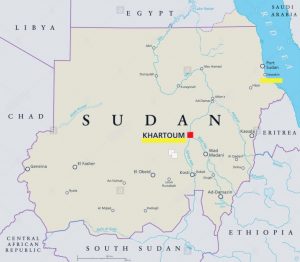 A calm capital, eastern entropy
A calm capital, eastern entropy
While tensions in the capital have eased with the passing of the aborted coup, the situation in eastern Sudan remains as strained as ever.
Some members of the Beja ethnicity group in eastern Sudan have effectively crippled Sudan’s economy having closed oil pipelines, ports, and two airports in protest over the current transitional government and the eastern track peace deal. The protest leader Muhammad al-Amin Turk called on Burhan to declare a state of emergency within the country, dissolve the civilian government, and end the peace deal in a statement addressing his supporters in Suakin, Red Sea State. Al-Amin claims the peace deal, signed with several former rebel groups in Juba last October, fails to represent them. The costly protest has severely impacted Sudan’s already beleaguered economy. Closing Port Sudan’s ports for only four days cost the country US$ 3.4 million, the ministry of transport said.
The Problem of the east is in Khartoum, not in the east
— Sovereign Council Member Mohamed al-Faki
During his interview with state television, Sovereign Council member al-Faki claimed the protests in eastern Sudan are being orchestrated in the capital. “The problem of the east is in Khartoum, not in the east,” he said. According to one security official who spoke on the condition of anonymity, elements of Sudan’s security forces are actively supporting the protests in Eastern Sudan since the demands of the protestors under al-Amin Turk are in line with the military. Sovereign Council leader al-Burhan, however, stressed that the armed forces have no connection to the eastern protests and have called for their resolve.
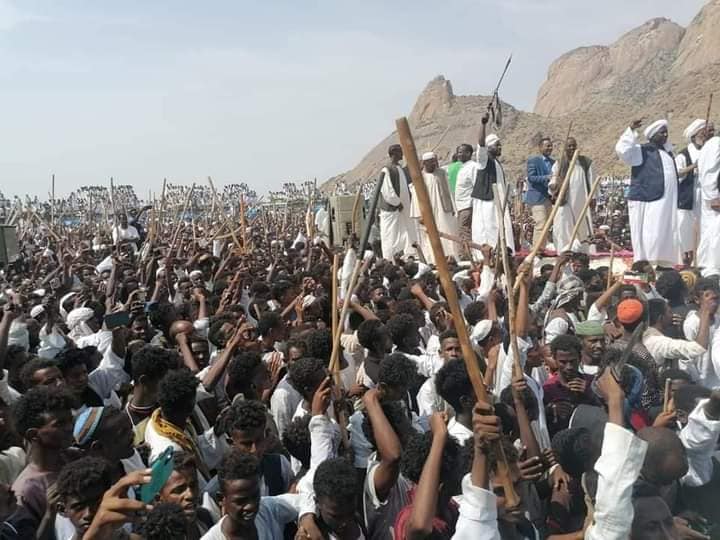
The protests, now over a week in duration, may not last much longer. Thousands of eastern Sudanese rallied on Saturday to show their support to the transitional government and the eastern peace agreement, countering the protest demands of Turk’s group.
More coups to come?
While the attempted coup and protests in Eastern Sudan may subside, the possibility of future instability is tenable. Some analysts suggest the alleged coup that took place last Tuesday was little more than a litmus test to see whether a future military coup could take place without public outcry. “In the wake of the apparent coup attempt, an abiding worry of diplomatic and domestic stakeholders is that the episode was meant to be a trial balloon to gauge street and military reaction to a military challenge to the government,” Horner told Ayin. “On the morning of the coup attempt, little response was in evidence from Sudanese in Khartoum.”
On the other hand, these same analysts suggest elements opposed to Sudan’s democratic transition have purposefully sabotaged development within the country to defuse any confidence in the current leadership. If true, this approach may not be working given recent positive developments within the country.
“The civilians have banked two significant successes recently that point to a turnaround in an all-important economic realm: for the first time in the transitional government’s two-year tenure, inflation has fallen, and Sudan’s balance of trade has improved markedly,” Horner said. “This success itself may worry military and civilian opponents of the government who have counted on the government’s failure in the face of a vast array of obstacles.”


